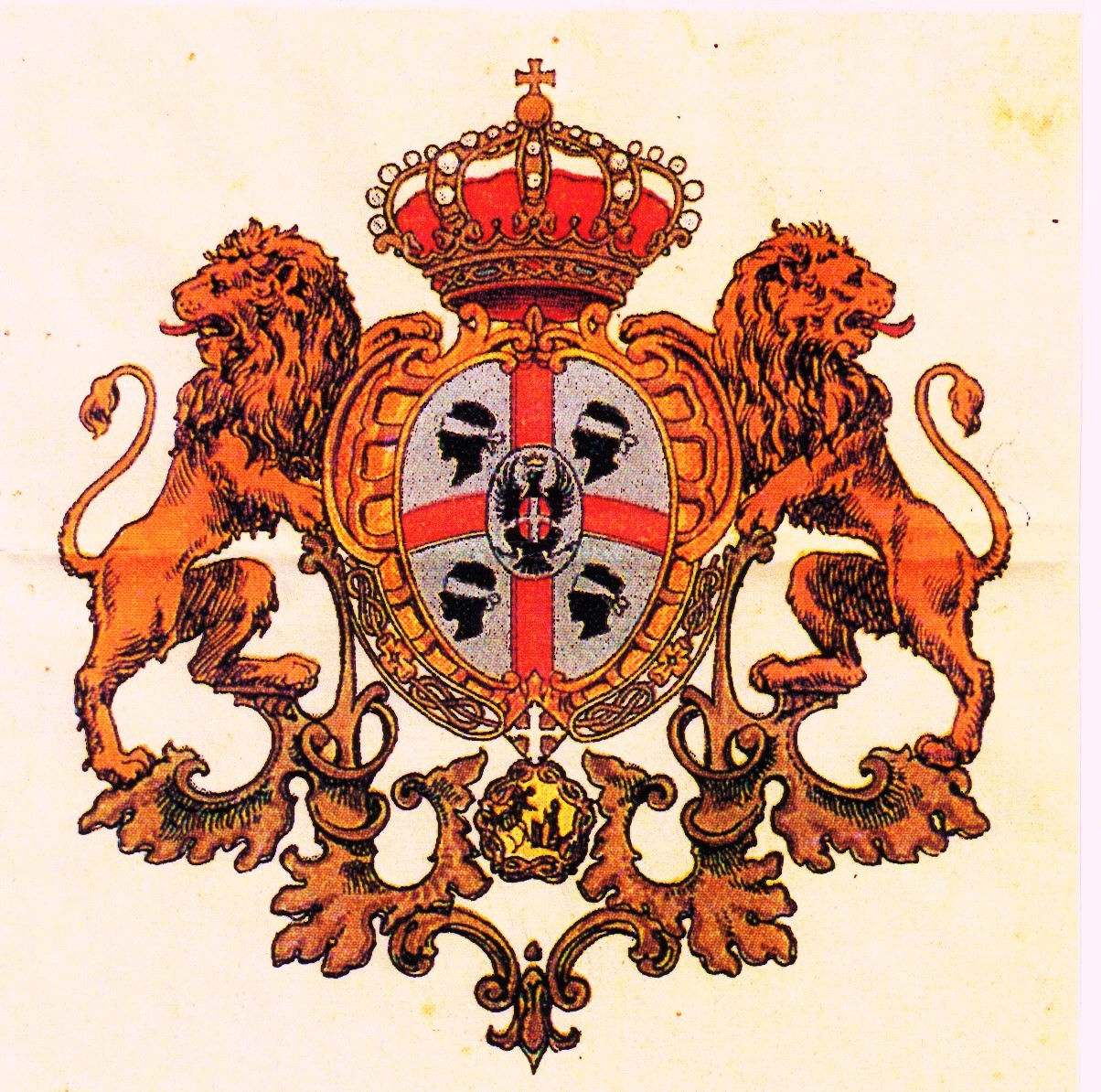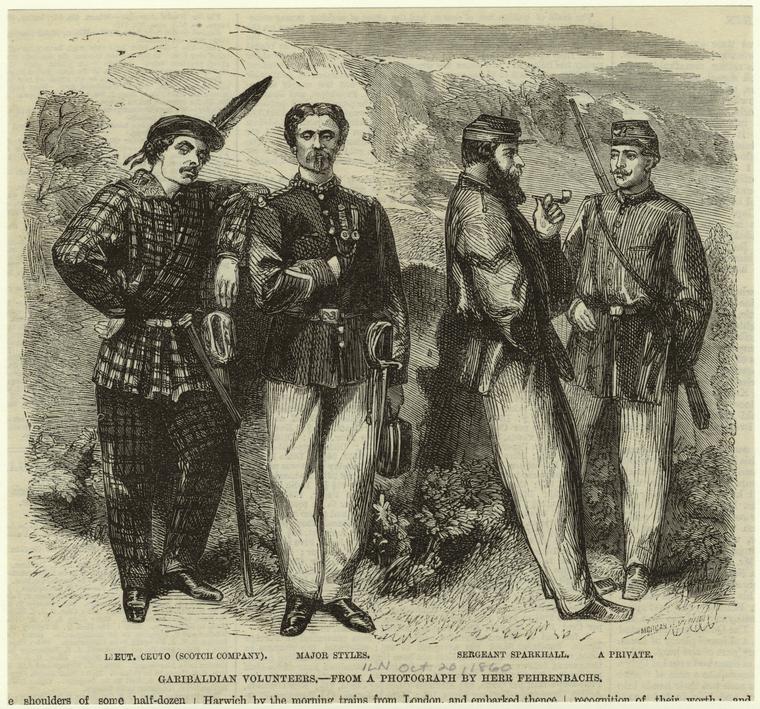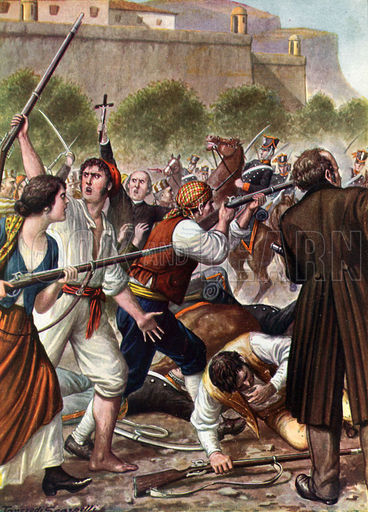|
Risorgimento
The unification of Italy ( ), also known as the Risorgimento (; ), was the 19th century political and social movement that in 1861 ended in the annexation of various states of the Italian peninsula and its outlying isles to the Kingdom of Sardinia, resulting in the creation of the Kingdom of Italy. Inspired by the rebellions in the 1820s and 1830s against the outcome of the Congress of Vienna, the unification process was precipitated by the Revolutions of 1848, and reached completion in 1870 after the capture of Rome and its designation as the capital of the Kingdom of Italy. Individuals who played a major part in the struggle for unification and liberation from foreign domination included King Victor Emmanuel II of Italy; politician, economist and statesman Camillo Benso, Count of Cavour; general Giuseppe Garibaldi; and journalist and politician Giuseppe Mazzini. Borrowing from the old Latin title '' Pater Patriae'' of the Roman emperors, the Italians gave to King Victor ... [...More Info...] [...Related Items...] OR: [Wikipedia] [Google] [Baidu] |
Hungarian Legion (Expedition Of The Thousand)
The Expedition of the Thousand () was an event of the unification of Italy that took place in 1860. A corps of Redshirts (Italy), volunteers led by Giuseppe Garibaldi sailed from Quarto dei Mille, Quarto al Mare near Genoa and landed in Marsala, Sicily, in order to conquer the Kingdom of the Two Sicilies, ruled by the Spanish House of Bourbon-Two Sicilies. The name of the expedition derives from the initial number of participants, which was around people. The Garibaldians, with the contribution of southern volunteers and reinforcements to the expedition, increased in number, creating the Southern Army (Italy), Southern Army. After a campaign of a few months with some victorious battles against the Bourbon army, the ''Thousand'' and the newborn southern army managed to conquer the entire Kingdom of the Two Sicilies. The expedition was a success and concluded with a plebiscite that brought Naples and Sicily into the Kingdom of Sardinia (1720–1861), Kingdom of Piedmont-Sardinia, ... [...More Info...] [...Related Items...] OR: [Wikipedia] [Google] [Baidu] |
Kingdom Of Italy
The Kingdom of Italy (, ) was a unitary state that existed from 17 March 1861, when Victor Emmanuel II of Kingdom of Sardinia, Sardinia was proclamation of the Kingdom of Italy, proclaimed King of Italy, until 10 June 1946, when the monarchy was abolished, following civil discontent that led to an 1946 Italian institutional referendum, institutional referendum on 2 June 1946. This resulted in a modern Italian Republic. The kingdom was established through the unification of several states over a decades-long process, called the . That process was influenced by the House of Savoy, Savoy-led Kingdom of Sardinia (1720–1861), Kingdom of Sardinia, which was one of Italy's legal Succession of states, predecessor states. In 1866, Italy Third Italian War of Independence, declared war on Austrian Empire, Austria in Italo-Prussian Alliance, alliance with Kingdom of Prussia, Prussia and, upon its victory, received the region of Veneto. Italian troops Capture of Rome, entered Rome in 1870, ... [...More Info...] [...Related Items...] OR: [Wikipedia] [Google] [Baidu] |
Giuseppe Garibaldi
Giuseppe Maria Garibaldi ( , ;In his native Ligurian language, he is known as (). In his particular Niçard dialect of Ligurian, he was known as () or (). 4 July 1807 – 2 June 1882) was an Italian general, revolutionary and republican. He contributed to Italian unification (Risorgimento) and the creation of the Kingdom of Italy. He is considered to be one of Italy's " fathers of the fatherland", along with Camillo Benso di Cavour, King Victor Emmanuel II and Giuseppe Mazzini. Garibaldi is also known as the "Hero of the Two Worlds" because of his military enterprises in South America and Europe. Garibaldi was a follower of the Italian nationalist Mazzini and embraced the republican nationalism of the Young Italy movement. He became a supporter of Italian unification under a democratic republican government. However, breaking with Mazzini, he pragmatically allied himself with the monarchist Cavour and Kingdom of Sardinia in the struggle for independence, subordinati ... [...More Info...] [...Related Items...] OR: [Wikipedia] [Google] [Baidu] |
Camillo Benso, Count Of Cavour
Camillo Paolo Filippo Giulio Benso, Count of Cavour, Isolabella and Leri (; 10 August 1810 – 6 June 1861), generally known as the Count of Cavour ( ; ) or simply Cavour, was an Italian politician, statesman, businessman, economist, and noble, and a leading figure in the movement towards Italian unification. He was one of the leaders of the Historical Right and Prime Minister of the Kingdom of Sardinia from 1852, a position he maintained (except for a six-month resignation) until his death, throughout the Second Italian War of Independence and Giuseppe Garibaldi's campaigns to unite Italy. After the declaration of a united Kingdom of Italy, Cavour took office as the first Prime Minister of Italy; he died after only three months in office and did not live to see the Roman Question solved through the complete unification of the country after the Capture of Rome in 1870. Cavour put forth several economic reforms in his native region of Piedmont, at that time part of the Ki ... [...More Info...] [...Related Items...] OR: [Wikipedia] [Google] [Baidu] |
Kingdom Of Sardinia (1720–1861)
The Kingdom of Sardinia was the Savoyard state of the Kingdom of Sardinia from 1720 to 1861. The kingdom united the island of Sardinia with the mainland possessions of the House of Savoy. Before 1847, only the island of Sardinia proper was part of the Kingdom of Sardinia, while the other mainland possessions (principally the Duchy of Savoy, Principality of Piedmont, County of Nice, Duchy of Genoa, and others) were held by the Savoys in their own right, hence forming a composite monarchy and a personal union, which was formally referred to as the "States of His Majesty the King of Sardinia". This situation was changed by the Perfect Fusion act of 1847, which created a unitary kingdom. Due to the fact that Piedmont was the seat of power and prominent part of the entity, the state is also referred to as Sardinia–Piedmont or Piedmont–Sardinia, and sometimes erroneously as the Kingdom of Piedmont. Before becoming a possession of the House of Savoy, the medieval Kingdom of Sardin ... [...More Info...] [...Related Items...] OR: [Wikipedia] [Google] [Baidu] |
Giuseppe Mazzini
Giuseppe Mazzini (, ; ; 22 June 1805 – 10 March 1872) was an Italian politician, journalist, and activist for the unification of Italy (Risorgimento) and spearhead of the Italian revolutionary movement. His efforts helped bring about the independent and unified Italy in place of the several separate states, many dominated by foreign powers, that existed until the 19th century. An Italian nationalist in the historical radical tradition and a proponent of a republicanism of social-democratic inspiration, Mazzini helped define the modern European movement for popular democracy in a republican state. Mazzini's thoughts had a very considerable influence on the Italian and European republican movements, in the Constitution of Italy, about Europeanism and more nuanced on many politicians of a later period, among them American president Woodrow Wilson, British prime minister David Lloyd George, Mahatma Gandhi, Indian prime minister Jawaharlal Nehru, and Indian independence activis ... [...More Info...] [...Related Items...] OR: [Wikipedia] [Google] [Baidu] |
Southern Army (Italy)
The Southern Army (Italian: ''esercito meridionale'') was the force of around 50,000 Italian and foreign volunteers which formed as a result of the Expedition of the Thousand. The name was coined by Giuseppe Garibaldi. Its officers wore red uniforms and so - like the Thousand - the force's rank and file became known as redshirts (Italy), redshirts. It was dissolved before the proclamation of the Kingdom of Italy. History Landing at Marsala and the ''picciotti'' Garibaldi landed at Marsala in May 1860 with the Thousand, a force mainly made up of northern Italian volunteers but also including 45 Sicilians. They were immediately joined by around 200 more Sicilian volunteers, with still more joining when Garibaldi proclaimed his dictatorship of Garibaldi, dictatorship of Sicily and Salemi, led by the Sant'Anna brothers. On 14 May 500 Sicilian volunteers arrived from the Erice campaign under the command of Giuseppe Coppola and the doctor Rocco La Russa. They then fought at the Battle of ... [...More Info...] [...Related Items...] OR: [Wikipedia] [Google] [Baidu] |
Five Days Of Milan
The Five Days of Milan ( ) was an insurrection and a major event in the Revolutions of 1848, Revolutionary Year of 1848 that started the First Italian War of Independence. On 18 March, a rebellion arose in the city of Milan which in five days of street fighting drove Joseph Radetzky von Radetz, Marshal Radetzky and his Austrian Empire, Austrian soldiers from the city. Background In 1848, the Milanese launched an Austrian Empire, anti-Austrian campaign as early as 1 January. On New Year's Day the Milanese started to boycott gambling and tobacco products, which were government monopolies that brought in over 5 million lire a year. The boycott culminated in a bloody street battle on 3 January, when Austrian soldiers, in batches of three, were being insulted and pelted with stones by an angry crowd. The soldiers then gathered together in groups of a dozen and charged the crowd with swords and bayonets, killing five and wounding another 59. Radetzky confined his troops to barracks ... [...More Info...] [...Related Items...] OR: [Wikipedia] [Google] [Baidu] |
Redshirts (Italy)
Redshirts at the Battle of Domokos The Redshirts (Italian: ''Camicie rosse'' or ''Giubbe rosse''), also called the Red coats, are volunteers who followed the Italian patriot Giuseppe Garibaldi during his campaigns. The name derived from the colour of their shirts or loose-fitting blouses that the volunteers, usually called Garibaldini, wore in lieu of a uniform. The force originated as the Italian Legion supporting the Colorado Party during the Uruguayan Civil War. The story is that Garibaldi was given red shirts destined for slaughterhouse workers. Later, during the wars of Italian unification, the Redshirts won several battles against the armies of the Austrian Empire, the Kingdom of Two Sicilies and the Papal States. Most notably, Garibaldi led his Redshirts in the Expedition of the Thousand of 1860, which concluded with the annexation of Sicily, Southern Italy, Marche, and Umbria to the Kingdom of Sardinia, which led to the creation of a unified Kingdom of Italy. His m ... [...More Info...] [...Related Items...] OR: [Wikipedia] [Google] [Baidu] |
Italy
Italy, officially the Italian Republic, is a country in Southern Europe, Southern and Western Europe, Western Europe. It consists of Italian Peninsula, a peninsula that extends into the Mediterranean Sea, with the Alps on its northern land border, as well as List of islands of Italy, nearly 800 islands, notably Sicily and Sardinia. Italy shares land borders with France to the west; Switzerland and Austria to the north; Slovenia to the east; and the two enclaves of Vatican City and San Marino. It is the List of European countries by area, tenth-largest country in Europe by area, covering , and the third-most populous member state of the European Union, with nearly 59 million inhabitants. Italy's capital and List of cities in Italy, largest city is Rome; other major cities include Milan, Naples, Turin, Palermo, Bologna, Florence, Genoa, and Venice. The history of Italy goes back to numerous List of ancient peoples of Italy, Italic peoples—notably including the ancient Romans, ... [...More Info...] [...Related Items...] OR: [Wikipedia] [Google] [Baidu] |
Carbonari
The Carbonari () was an informal network of Secret society, secret revolutionary societies active in Italy from about 1800 to 1831. The Carbonari may have further influenced other revolutionary groups in France, Portugal, Spain, Brazil, Uruguay, the Ottoman Empire, and Russia. Although their goals often had a Patriotism, patriotic and Liberalism, liberal basis, they lacked a clear immediate political agenda. They were a focus for those unhappy with the repressive political situation in Italy following 1815, especially in the south of the Italian peninsula. Members of the Carbonari, and those influenced by them, took part in important events in the process of Unification of Italy, Italian unification (called the ''Risorgimento''), especially the failed Revolutions of 1820, Revolution of 1820, and in the further development of Italian nationalism. The chief purpose was to defeat tyranny and establish a constitutional government. In the north of Italy, other groups, such as the Ade ... [...More Info...] [...Related Items...] OR: [Wikipedia] [Google] [Baidu] |
United Provinces Of Central Italy
The United Provinces of Central Italy (), also known as the Confederation of Central Italy or General Government of Central Italy, was a short-lived military government established in 1859 by the Kingdom of Piedmont-Sardinia. It was formed by a union of the former Grand Duchy of Tuscany, the Duchy of Parma, the Duchy of Modena, and the Papal Legations, after the Second Italian War of Independence. Following a plebiscite in March 1860 where the people of the provinces voted in favour of joining the Kingdom of Sardinia, the United Provinces of Central Italy were formally annexed by Sardinia. This paved the way for the declaration of the Kingdom of Italy on March 17, 1861. Establishment Prior to the establishment of the Kingdom of Italy, the Italian Peninsula existed as an assortment of various states or provinces, with no central government. Support for the ''risorgimento'' – “resurgence”, or movement towards national unification – gained traction among the Ital ... [...More Info...] [...Related Items...] OR: [Wikipedia] [Google] [Baidu] |






